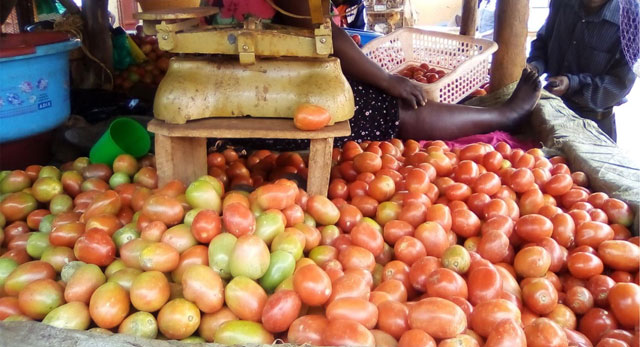
Kampala, Uganda | THE INDEPENDENT | Uganda’s increased headline inflation rate has been attributed to the soaring prices of fresh leaves vegetables and tomatoes. This is according to the Uganda Bureau of Statistics (UBOS) Consumer Price Index (CPI) report for the last 12 months ending May 2024.
The report shows that the annual inflation measure increased to 3.6 percent, compared to 3.2 percent for the same period ending in April. According to the report, tomato prices increased by 19.5 percent in the year ending May 2024, compared to 3.4 percent in April.
It further states that “Fresh leaves prices increased by 13.5 percent in the year ending May 2024, compared to 1.6 percent registered in April 2024.”
As per the report, these two commodities registered the highest price increment rates from the surveyed period. This increment saw the annual food crop and related items register an increase of minus 1.4 percent, up from the minus 2.4 percent of April.
While releasing the CPI, Edgar Niyimpa, a principal statistician at UBOS, highlighted that the annual core inflation increased to 3.7 percent, up from the 3.5 percent registered in the year ending April, mainly driven by passenger transport by road, which went up to 4.4 percent from 2.2 percent the previous month, and restaurant meal prices, which increased by 8.1 percent, up from 6.3 percent in the same period.
Niyimpa says, “the annual Energy Fuel and Utilities (EFU) inflation increased to 9.5 percent for May, compared to 7.9 percent for the year ended April. This was mainly due to the charcoal and firewood prices increment rate, which stood at 21.3 percent against 18.8 percent, and 13.8 percent against 6.9 percent respectively.”
He added that for liquid energy fuels, petrol prices increased by 8.1 percent against 6.9 percent, and diesel increased by 1.1 percent, up from 0.1 percent last month.
According to the release, the other goods inflation stood at 1.8 percent, down from 2.0 percent registered in April. This was mainly attributed to second-hand vehicles, whose prices increased by minus 3.6 percent, down from minus, and refined oil prices, whose prices rose by minus 6.6 percent against 8.6 percent.
Geographically, at 5.1 percent, Jinja registered the highest inflation rate in the past 12 months, due to its annual food and non-alcoholic beverages inflation, which increased to 2.8 percent from minus 0.8 percent. Jinja was followed by Kampala’s high-income segment, at 4.6 percent. The least was recorded in Kampala’s middle-income sector at 2.0 percent.
Meanwhile, the month-to-month comparison showed commodity prices rose by 0.2 percent, which is two percentage points lower than the 0.4 percent in April. This was mainly due to the rates of monthly other goods, recorded at 0.1 percent, below 0.2 recorded the previous month.
Still on the month-to-month comparison, the other decrease was registered in food crops and related items category, which was registered at 1.2 percent from 2.0 percent due to vegetables, tubers plantain, cooking bananas, and pulses whose prices descended by 1.0 percent from 1.8 percent.
“Specifically, cooking banana prices decreased by 13.1 percent in May from a 4.8 percent drop recorded in April, and onion prices decreased by 2.3 percent in May 2024 from a 19.8 percent rise recorded in April 2024. In addition, pineapple prices decreased by 12.4 percent in May from a 27.3 percent rise recorded in April, and monthly passion fruit prices decreased by 8.9 percent in May from the 3.7 percent rise recorded in April 2024,” reads part of the report.
The other decreases on month-to-month were observed in the diesel prices, which stood at 1.3 percent in May from a 1.4 percent raise recorded in April 2024.
*****
URN
 The Independent Uganda: You get the Truth we Pay the Price
The Independent Uganda: You get the Truth we Pay the Price



